Reasoning About Garden Observations
Program Transcript
Silveira & Students: (singing) …gonna make this garden grow. All it takes is a rake and a hoe…
Silveira (Interview): My name is Brian Silveira. I'm at Pacific Primary school, and I teach in the Pre-K class. That's the oldest class right before kindergarten.
Silveira & Students: (singing) …'til the rains come tumbling down.
Silveira: All right.
Silveira (Interview): The garden has evolved over many years, and it has become such a focus for learning, especially for the children to have some agency and some ownership. They know which kinds of bugs are really good for the garden, the ones that decompose the compost in the composter.
Student: I found a little worm here! Guys, here come some worms! Ew! Disgusting!
Silveira (Interview): Today's lesson was an open-ended lesson, and the children were exploring their environment in the, um, in the garden.
Silveira: Polar bears, come on over around this table and I'll show you some of the things we have this morning to do. So some of you made signs for the plants.
Student: I did.
Silveira: You did?
Student: I did!
Silveira: Okay. Well, with your signs, since you're in the garden I thought you could, if you wanted to draw the plant that you, that's on your sign you may. This one says, it starts with mmmm.
Student: Meh---
Silveira: Mint. And what does that one say?
Student: Strawberry…
Silveira: Strawberries.
Silveira (Interview): They were observing the, the plants that were growing, the, the fruits and the vegetables. The intention that I had was for the children to really look closely at the things that they were doing, and so the teaching came just with noticing things a little bit closer.
Silveira: What do you notice when you move it a little bit?
Student: It shakes.
Silveira: It shakes.
Silveira (Interview): When Lulu was drawing her tomato, she had stopped looking at it, so we went closer to look at it and she really noticed all the little star points, and you could see in her drawing how she changed her perception of that.
Silveira: Which apples are you looking at?
Student: One is on the bottom of the…
Silveira: This one? Do you want to stand up and look at the top of it to see what it looks like? Huh! It fell off! Oh no! Now you can really look it. You can hold it…Let's cut the apple in half and see what it looks like inside. What do you think of that? What do you think it's going to look like inside?
Students: Seeds!
Silveira: Think you're gonna find some seeds in there? What else?
Student: White!
Silveira: White? What do you think?
Student: Skin.
Student: Seeds!
Silveira: Seeds? How is going to taste?
Student: Apple seeds!
Silveira: Look inside. What shape do you see?
Students: X!
Silveira (Interview): I use open-ended questions to get children to focus their attention and to be able to articulate what they're noticing.
Silveira: And look at the seeds. Does this look like the apple seeds that you get in your apples?
Students: No!
Silveira: Why? What's different?
Student: Because it's green!
Student: It looks like a tooth!
Silveira: It looks like a tooth, doesn't it? How do you think it's gonna taste?
Student: Good.
Silveira: But good means what? Sour, or...
Student: Sour!
Silveira: Oh! That is really sour! I'll tell you something. If we leave this on the tree longer, what do you think is going to happen to it?
Student: Bigger.
Silveira: What? It'll get bigger. What…
Student: It'll get bigger, bigger, it'll fill up the whole school.
Silveira: So it'll be really big. Do you think it will change in any other way?
Student: It might become red.
Silveira: It might become red. Do you think it'll still be like a lemon?
Student: No.
Silveira: No?
Silveira (Interview): Open-ended questions leave a lot of space for children to talk about what they know about.
Silveira: Is there a bug in there? Let's see. When you get raspberries at the store, do they have bugs?
Student: No.
Silveira: Why not?
Student: Cause they, uh, I don't know.
Silveira: Yeah, I wonder why..
Student: Maybe because they take them out.
Silveira: Maybe because they…
Student: They find bugs.
Silveira: They find bugs and then they take them out?…And, tell me how it tastes.
Student: Awesome. Delightful!
Silveira (Interview): I want children to be discovering all the time and I just sort of want to be a catalyst for them.
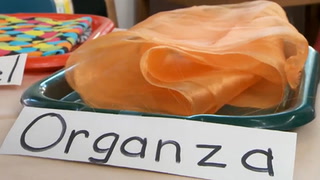
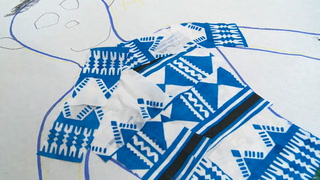
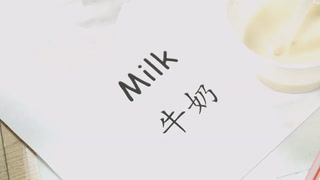
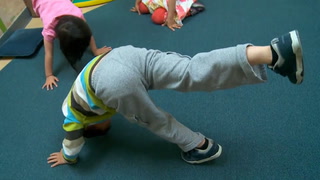
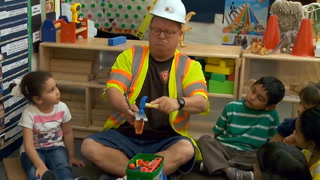
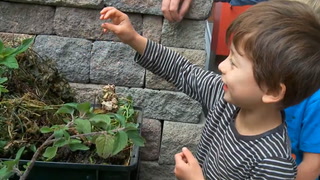
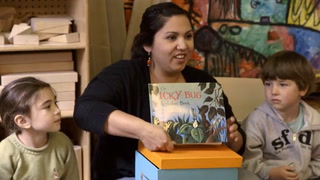
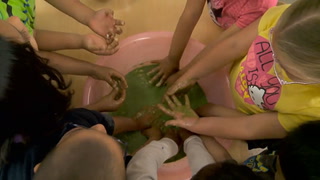
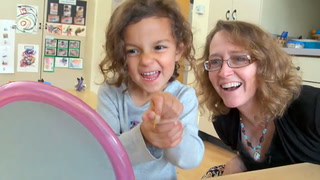
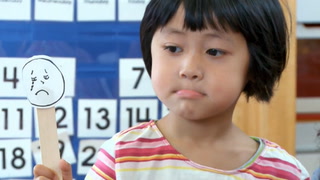








7 Comments
Emily Smith Apr 17, 2022 6:08pm
I love that the kids planted a garden and that gave them the hand on experience and that opened the door for them to get more envole!!
Denise Monaghan May 5, 2016 3:24pm
Stella Ajike Nov 2, 2015 2:24pm
Carrick Robertson Mar 4, 2014 12:10am